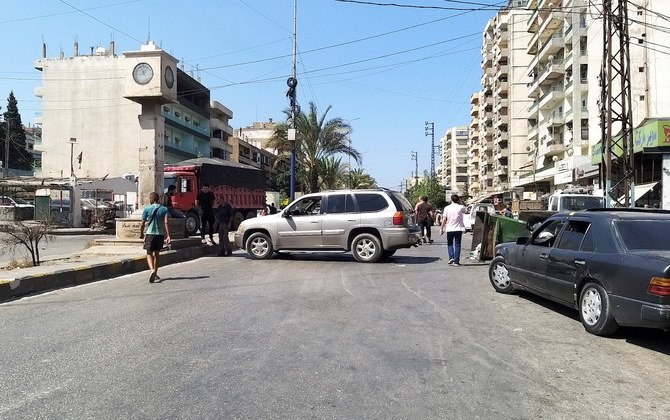BEIRUT: Angry Lebanese blocked roads across the country on Thursday, a day after the central bank said it could no longer afford to subsidise fuel imports below the black market rate.
As the economy crumbles and Lebanon’s foreign reserves dwindle, the decision has been considered a de facto lifting of fuel subsidies.
Confrontations with soldiers erupted in Tripoli amid a shortage of diesel to run private generators, which are only available on the black market at double the subsidized price.
Protests also erupted around the house of Prime Minister-designate Najib Mikati in Tripoli.
Protesters from the southern town of Sarafand stormed the Al-Zahrani power plant demanding electricity as the diesel shortage is preventing the operation of private generators.
They stressed “nepotism in distributing diesel to the powerful and barely giving any to ordinary people.”
People blocked roads in the north, south and east of the country in protest against the deteriorating living conditions.
Motorists were trapped in long queues outside the remaining active petrol stations, rushing to fill up before the Ministry of Energy announced new prices.
The cost of petrol is expected to at least triple, according to projections by the Information International think tank.
The Lebanese pound has lost more than 90 percent of its value against the dollar on the black market in less than two years.
Riad Salameh, governor of Lebanon’s central bank, informed President Michel Aoun that he “is unable to continue subsidizing fuel except under a law issued by parliament allowing the use of mandatory foreign exchange investments.”
A campaign was launched against Salameh’s decision by political actors, most notably the head of the Free Patriotic Movement, MP Gebran Bassil, who said the governor’s decision is a “coup.”
Experts anticipated the price of a fuel gallon to reach 336,000 Lebanese pounds ($222) based on the dollar’s exchange rate on the black market, which is equivalent to half of the minimum wage in Lebanon. They also speculated that the price of a diesel gallon could reach 272,000 pounds if the exchange rate of 20,000 pounds to the dollar is adopted.
Bassil accused Salameh of “committing a massacre against the Lebanese,” and said he is the “governor of the central bank, not the country’s governor.” He called on his supporters to “hit the streets.”
Druze leader Walid Jumblatt said: “The decision of the central bank’s governor is to stop the smuggling of fuel to Syria.”
He said the solution to the fuel crisis is the development of public transport and that there is “no escape for the president and his political team.”
Economic analyst Violette Balaa told Arab News: “The decision to subsidize things was a temporary measure that may have helped citizens to pass a difficult stage, but the measures must now be radical. There should be a rescue government that carries out reforms and shows credibility to the international community.”
Balaa said: “Salameh’s decision to stop subsidizing fuel is right because he cannot use people’s deposits that are part of the mandatory reserve. He repeatedly warned that the policy of subsidy benefits smugglers, monopolists, big traders and the wealthy in Lebanon.”
Separately, the quorum of the plenary session of parliament that was scheduled to discuss lifting the immunities of deputies who are suspects in last year’s Beirut port blast was not completed.
Thirty-nine deputies attended the session. Most of them were from the Hezbollah bloc, the Development and Liberation bloc headed by Parliament Speaker Nabih Berri, the Marada Movement, the Syrian Social Nationalist Party and three deputies represented the Future bloc.
Fifteen protestors from families affected by the Aug. 4, 2020 blast were injured by severe beatings they received on Wednesday night by security guards.
Activists violated the security measures taken in Beirut’s Palace of Justice and entered the building, shouting slogans calling on the judges to “be impartial and unbiased in the investigation of the port explosion.”














